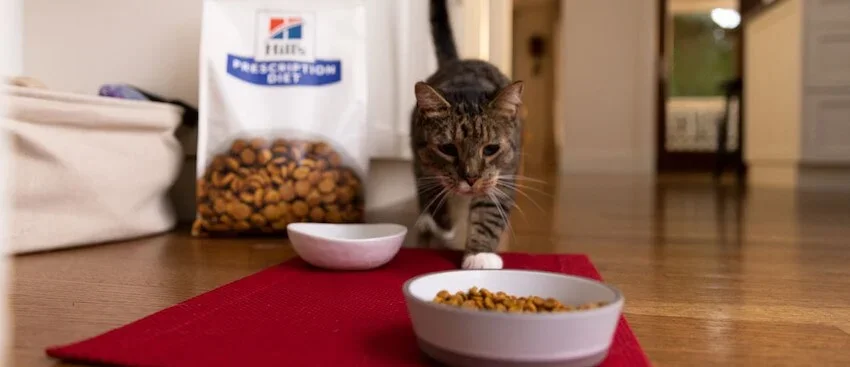Last Updated: 18/06/2025
Chronic Digestive Upsets in Pets
Learn the common causes and solutions for chronic digestive troubles for your pet.
Author: Dr Jacqui Victor BVSc MANZCVS (Medicine of Cats)
Reading Time: 19 minutes - medium read
Is your furry friend constantly dealing with digestive problems? Have you tried countless remedies without success? You're not alone. Chronic digestive issues in pets can be a frustrating and expensive ordeal.
Multiple vet visits can be stressful for both you and your pet. It's easy to feel discouraged when treatment seems ineffective. Remember, diagnosing and treating gastrointestinal problems can be a complex process, often requiring a series of tests and treatment trials.
However, it's crucial to stay focused on your pet's well-being. By working closely with your veterinarian, you can develop a personalized plan to help your pet live a happier, healthier life.
If your pet is suffering from digestive upsets and requires some extra support, schedule an appointment with your vet to enquire about how a therapeutic diet, like Hill's Prescription Diet , may help.
Gastroenteritis Explained
Gastroenteritis is inflammation of the gastrointestinal tract (the stomach and intestines), and in simple terms refers to an upset stomach. Gastroenteritis is quite a common condition in our pets and can be due to many different causes with a wide range of symptoms.
Common causes of gastroenteritis include:
- Dietary indiscretion: eating spoiled foods or non-food items
- Infectious causes: bacteria (eg Salmonella), viruses (eg parvovirus) or parasites (eg Giardia)
- Changes in intestinal flora
- A food allergy or sensitivity
- Gastrointestinal ulcers
- Gastrointestinal cancers
- Foreign bodies
- Intestinal obstruction
- Medications
- Toxins
- Other diseases (eg kidney and liver disease)
Common signs of gastroenteritis include:
- Diarrhoea, commonly large volumes of watery stools with increased frequency
- Vomiting
- Blood in the stool, or black tarry faeces
- Lethargy
- Abdominal pain
- Nausea, drooling, swallowing frequently
- Decreased appetite
- Dehydration
The Role of Therapeutic Veterinary Diets
What are therapeutic veterinary diets?
Therapeutic veterinary diets are foods which may be recommended by your pet's treating veterinarian to help manage specific health conditions.
There are many retail diets available on the market which provide some extra digestive support, and do not require a veterinary recommendation to be able to purchase, like Hill's Science Diet Perfect Digestion, and Hill's Sensitive Stomach and Skin. Retail diets may help pets who have mild stomach issues (such as gas, occasional loose stools and general sensitivities), however they are not specifically designed to provide nutritional support for pets with diagnosed health conditions.
Conversely, therapeutic veterinary diets do require a veterinary recommendation and are aimed at providing nutrition for pets with an already established health condition. Therapeutic veterinary diets, like Hill's Prescription Diet, are generally recommended by a vet for a pet suffering from an ongoing issue, and may also be used long-term to reduce the recurrence of signs of certain health conditions. Therapeutic veterinary diets are tailored to meet the key nutritional needs of pets with specific health conditions and provide benefits backed up by scientific studies.
Therapeutic veterinary diets should only be used under the recommendation and supervision of your pet's veterinarian. Pets on a therapeutic vet diet will require regular check-ups with their vet to make sure that their diet is still required, as their dietary needs may change over time.

How do therapeutic veterinary diets work?
Nutrition plays a key role in the management of chronic gastrointestinal issues, which makes sense given the job of the intestinal tract is to digest and absorb nutrients. Nutrition is so important that it is even possible to manage certain conditions with dietary therapy alone.
There are a variety of therapeutic gastrointestinal diets available from premium science backed brands, like Hill's Prescription Diet, that help the digestive tract in different ways. This includes being highly digestible (Hill's i/d Digestive Care), containing increased fibre (Hill's Gastrointestinal Biome) and being low in fat (Hill's i/d Low Fat Digestive Care).
Hill's Prescription Diet Gastrointestinal Biome
Specifically formulated to nourish the gut microbiome and promote regular healthy stools for pets prone to gastrointestinal upset.
Benefits:
- clinically shown to help firm loose stools in 24 hours and reduce risk of recurrence
- proprietary ActivBiome+ ingredient technology shown to rapidly activate beneficial gut bacteria and support a healthy GI microbiome balance
- unique blend of prebiotic fibres to promote regular bowel movements and help balance digestive function
- high levels of omega-3 fatty acids (DHA & EPA)
Hill's Prescription Diet i/d Digestive Care
Clinically shown to help settle digestive upsets.
Benefits:
- highly digestible formula to ensure easy nutrient absorption
- high levels of electrolytes and B vitamins to replace nutrients lost from digestive upset
- Soluble and insoluble fibres (including prebiotic fibre) to promote regular bowel movements and help balance digestive function
- complete and balanced for puppies and kittens, as well as adults
Hill's Prescription Diet i/d Low Fat Digestive Care
Great tasting low fat nutrition clinically shown to help settle fat-responsive digestive upsets in dogs.
Benefits:
- low fat and highly digestible to help improve digestion, nutrient absorption & lower blood fat levels
- ActiveBiome+ ingredient technology rapidly activates the gut microbiome to support digestive health and well-being
- unique prebiotic blend & ginger to promote beneficial gut bacteria activity & improve stool quality
- enriched with clinically proven antioxidants & Omega-3 fatty acids

When to Consider Therapeutic Veterinary Diets
Therapeutic vet diets are recommended for use once your pet has a diagnosed medical condition that would benefit from tailored nutrition. Typically introduced following diagnosis (e.g. pancreatitis), these diets are especially helpful for chronic digestive issues as they can help with common signs of digestive issues and reduce the risk of future flare-ups. Your vet may recommend a therapeutic vet diet alone or in conjunction with other treatments.
If retail diets have failed to improve symptoms or if symptoms recur, a therapeutic diet may be recommended. Therapeutic diets are nutritionally complete and balanced, allowing pets with chronic digestive issues to remain on them long-term under veterinary supervision.
For pets with acute gastrointestinal signs, like vomiting or diarrhoea due to dietary indiscretion (i.e. eating something they shouldn't), short-term use of a therapeutic diet such as Hill's i/d Digestive Care may suffice until symptoms resolve, followed by a gradual return to the regular diet under veterinary guidance.
Your pet's treating veterinarian can provide tailored advice on nutrition based on your pet's specific needs and medical history. They will provide a detailed plan for your pet and let you know the best time to introduce the therapeutic vet diet.
Hill's Prescription Diet Poop Academy
Transitioning to a Therapeutic Diet
When introducing your pet to a therapeutic diet, do so gradually over the course of 7 days to avoid any tummy upsets. We recommend keeping approximately a week's worth of your old food in reserve for this.
We recommend the following:
- Day 1-2: Mix 25% of the new food with 75% of the old food.
- Day 3-4: Mix 50% of the new food with 50% of the old food.
- Day 5-6: Mix 75% of the new food with 25% of the old food.
- Day 7 onwards: Feed 100% of the new food.

It's not uncommon for picky eaters to turn their nose up at something new, and by introducing a new food slowly this helps increase their acceptance of it. Other ways to help tempt fussy pets to accept their new food include mixing the kibble with some warm water, mixing in some therapeutic wet food, and heating the wet food in the microwave for a short burst to help improve the flavour and release a strong aroma that pets love.
To help make the transition as smooth as possible, maintain a regular feeding routine and use the same bowl placed in the same area, at the same times each day. Also, make sure that all members of your household are aware and on board with your pet's new diet plan, as unfortunately a lack of compliance is a common reason for dietary treatment failures
When doing a food trial for pets with gastrointestinal disease, you should generally expect to see symptoms improve within 2-4 weeks of feeding the therapeutic diet solely, although this can vary between individuals. If you are not seeing improvement after that time, please consult with your pet's treating veterinarian to see if another type of diet is indicated.
For more information, read our handy article: How to Introduce a New Food to Your Pet.
Further Reading
Want to read more? Check out our other articles:
Your Dog's Digestive System Explained
Best Sensitive Stomach Food for Pets
How To Make Dental Care Easier
History
Our experts continually monitor the health and wellness space and we update our articles when new information becomes available.
Sat Feb 24 2024
Written by Dr Jacqui Victor BVSc MANZCVS (Medicine of Cats)Dr Jacqui Victor BVSc MANZCVS (Medicine of Cats)
Veterinarian, MANZCVS (Feline Medicine)
Dr Jacqui graduated from the University of Melbourne in 2011 and has worked in various small animal practices around Melbourne. Dr Jacqui loves witnessing the human-animal bond, and feels privileged that she is in a profession which allows her to make a difference to so many people and their loved ones. Dr Jacqui has a special interest in Feline Medicine, and attained her Membership Qualification in Feline Medicine with the Australian and New Zealand College of Veterinary Scientists in 2022.

